The Vaclav Havel airport in Prague was nearly empty when we arrived on our Ryanair flight from Bordeaux, clean, orderly, and quiet. The bus that would take us to the metro, one of the finest in systems in Europe, was easy to find. We saw a coffee kiosk outside of Smíchovské nádraží station on our way to the Botel Vodnik and headed that direction with no expectations or hopes that for a simple medicinal dose of caffeine.
The barista, a tall winsome fellow with sleeve tattoos and a beanie, chatted with us as he made our order. When we told him we were there for the wine scene, he was amused. He handed us two small paper cups of black velvet.
“You're here for Czech wine? Have you tasted it before?”
Although Czechia is geographically and geologically little different from its neighbors Germany or Austria, history has conspired against its viticultural reputation. Centuries of war and foreign occupation have continually hit the reset button on the region. Most recently, the “quantity not quality” approach favored by the communists was easily translated into the “quantity not quality” approach favored by the capitalists. Small, quality-minded winemakers were further hampered by regulations from the EU that limit Czech vineyard areas to historic levels and prevent the planting of new vineyards. Winemakers have had to acquire their vines piecemeal from the few unwanted rows allotted to each family for home production during the communist era. However, unlike most other regions where natural winemakers have to prove themselves against the best conventional wine and legendary brands, in Czechia natural winemakers are virtually the only producers dedicated to making high quality wine. How often does a group of winemakers get to completely define a terroir? It's a rare opportunity and they know it.
Have we tasted Czech wine, the Prague barista asks? My friend, have you?
After boarding Botel Vodnik, our maritime domicile, we explored Prague until the wine bars opened, aimless wanderers, bouncing from one architectural wonder to another. We eased into our vinous passion with a couple fine local wines at Zem, the Czech-Japanese fusion restaurant we chose for lunch. Later, on the busy arterial flow of Prague's touristy heart, between the castle and the bridge, a woman in front of us turned around and looked at us as though she knew us, and she did! She was one of our regulars from our Tannat restaurant days, full of warm words and remembrances. These coincidences are to be expected in a world as connected as ours, but I still naively take them as a sign of fate, that I am where I am supposed to be and that things are marvelously in order. Thank you, M, for being an emissary of some benevolent (imagined) guiding hand.
A few hours later, overwhelmed by Prague's marvels and chilled by the persistent late winter gloom, we blew into Autentista like two thirsty gulls from the Vltava River. Located daringly just a short walk from the Charles Bridge, aka the Times Square of Prague, Autentista has staked its future on the growing numbers of wine tourists in one of Europe's beer capitals. We were the first customers of the night, so we sat at the bar in the back of the small space with crisp architectural lines that show off the ancient foundations of the building. Jiří jumped right in, participating in the slow exchange of courtesies and questions by which wine industry folks make ourselves known to each other. After commenting on the row of Fleury champagne bottles—we visited the domaine last fall—Antonin, co-founder of the bar and the Prague natural wine festival alongside Bogdan Trojak— introduced himself. After raving about the Fleury wines and the new biodynamic cellar, Antonin admitted that he was also a champagne importer. The clarity and rigor of the bar's pristine design suddenly made perfect sense.
Although Autentista has a strong Czech wine selection, they take a global approach to the art form. We recognized a number of old friends in the labels on the wall—every wine bar we visited in Prague was also a wine shop—but were in the mood for something different. Antonin and Jiří confirred about what to open. At Autentista, you don't get to choose your wine per se. There is no wine list. Instead, the somms talk to you and open a bottle they think you'd like, pouring you tastes until you're happy with a selection. We ordered a local cheese board and then later met the cheesemaker himself when he came in with that week's order.
Our tasting took us through Czechia, Hungary, France, Italy, and Portugal. We were especially pleased with an Italian producer unknown to us, Fattoria San Lorenzo, and brought a bottle of a champagne Antonin produced in collaboration with a French winemaker back to the Botel Vodnik along with a handwritten list of restaurants, coffee shops, and bars to visit.
Veltlin is described as the “must see” natural wine bar in the city, located, blessedly, in the Karlin neighborhood some distance from the city center behind and to right of Jan Žižka, ferocious and one-eyed, who overlooks the city from a hilltop monument.
We arrived early again—thanks to Sarah's influence we don't really do late nights anymore and it's for the best—and sat in the corner. Veltlin is a more personal space-- a local artist crafted wallpaper featuring cartoons of the bar's founders and other notables as well as a map of the Austro-Hungarian Empire, the inspiration for the bar's winelist. Zdenda gave us the rundown. Unlike Autentista, at Veltlin you have a choice. Every choice, in fact. They'll open any bottle from their collection of hundreds. “Go to the cave! We'll open anything!” Zdenda said, and we did.
Among other things, we drank a very fun Sauvignon Blanc/ Neuburg pet-nat from Vina Herzanovi, whose wines we saw almost everywhere in Prague, a bright young Bohemian Riesling from the owner of the bar, (Bodgan Trojak again), and an Alte Reben Furmint with skin contact from Austria that I just adored.
Just as we were about to leave, the other somm, Kristýna, comes over to say hello. Marking us as fellow wine pros, suddenly our table was again filled bottles (the Osička and Bystřický wines were both stand-outs) and Kristýna is giving us the deep history of Veltlin, how she takes coffee to Milan Nestarec's wife when she's in Moravia, and all about her epic two month trip living out of a car in New Zealand's wine regions. She's a small (very small) winemaker too! For the past two harvests, friends have given her some grapes which she ferments in the Veltlin's cellar. We tasted her brand new wine from the little known Isabella grape, and left feeling like we had made a friend.
Shortly after we took a train to Brno in Moravia itself and met four winemakers, but those are other stories for other days. We returned to Prague, for a final two nights, heads and hearts fat and happy from all the generosity we encountered in the south.
We almost didn't go to the last wine bar on our list, Fajnšmekr, but our passion for urban walking led us to the Staré Vršovice neighborhood. As we approached the bar, I discovered that we were near an elementary school named in honor of one of my favorite Czech writers, Karel Čapek, author of, among other things, The War with the Newts, in which a race of intelligent newts appear in the oceans but we treat them and (each other) so poorly that they go to war with human kind.
“The earth will probably sink and drown; but at least it will be the result of generally acknowledged political and economic ideas, at least it will be accomplished with the help of the science, industry, and public opinion, with the application of all human ingenuity! No cosmic catastrophe, nothing but state, official, economic, and other causes. Nothing can be done to prevent it.”
Fajnšmekr was just up the street. Whereas Veltlin's neighborhood is trendy in the way some people like to complain about, this felt like just a neighborhood. The place was tiny, just one bench near the front window, a four top table, and a bar with two seats next to a deli display case. We were planning on a short, incognito visit. We were near the end of our two week trip and on the cusp of a traveler's ennui, but by this time we had met a number of the winemakers whose bottles crowded the shelves, and the bartender, Anna, was easy to talk to, so it went the other way. This was only Anna’s third shift! Two other men came in and sat at the bar. Before long, in the way of very small bars, we were all talking, sharing our favorite wines, splitting a bottle of champagne, exchanging winemaker stories, explaining where the hell in Manhattan our restaurant had been, and having perhaps too grand a time.
The two regulars we met, quite successful and in their prime, both had the same natural wine story. They came in to Fajnšmekr because it was in their neighborhood and soon realized that they consistently felt better after a night of drinking there. Not long after, they were attending the many winemaker events held there and finding natural wine lists on their travels. Now they are friends of the owner and complete converts. This is the strength of a neighborhood wine bar over larger venues. While it is always lovely to see a natural wines on the lists in fine dining restaurants, or a bottle begrudgingly awarded 90 points from a legacy publication, it is the small bars, the neighborhood joints, and the little shops that are doing the real work.
Despite ourselves, it turned into a fun little party, the sort you have to flee or suffer the consequences, and we did a little of both.
In our final night in Czechia, we hit the town with a Czech friend. Julius IV is an ophthalmologist, a world traveler, an author, and scion of a notable family in České Budějovice. He wanted to show us his Prague. We went to a Rhone Valley themed pour-your-own-wine-from-a-box bar just off the river, then to a pour-your-own-Pilsner bar in the old town where Sarah poured her first beer, then to a crowded local joint for a traditional meat-heavy meal and more beer, then across the Charles Bridge to another beer hall, reputably “the best” in Prague, with an medieval cellar in the lower levels. There wasn't a good bottle of wine anywhere near us that night, but we had a grand time. We even managed to get almost three hours of sleep before our flight back to Bordeaux.
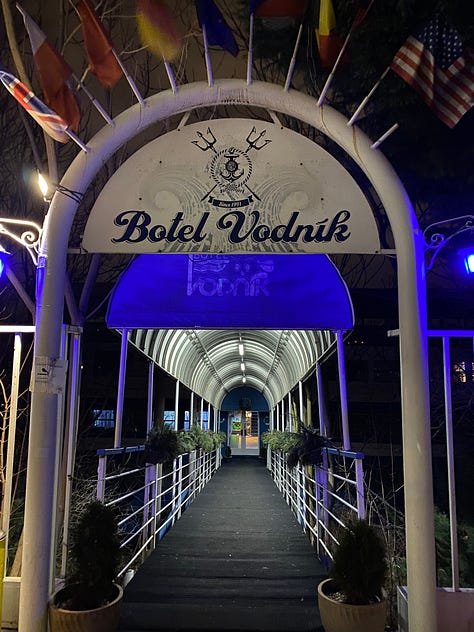
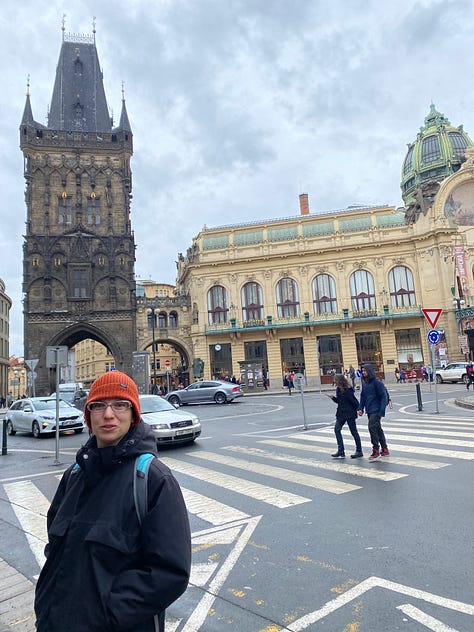
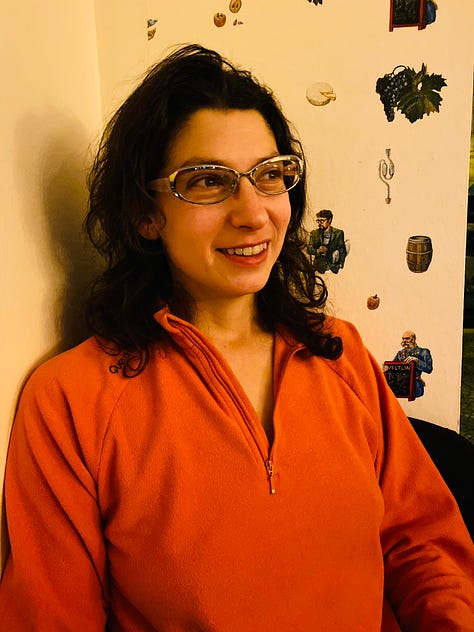
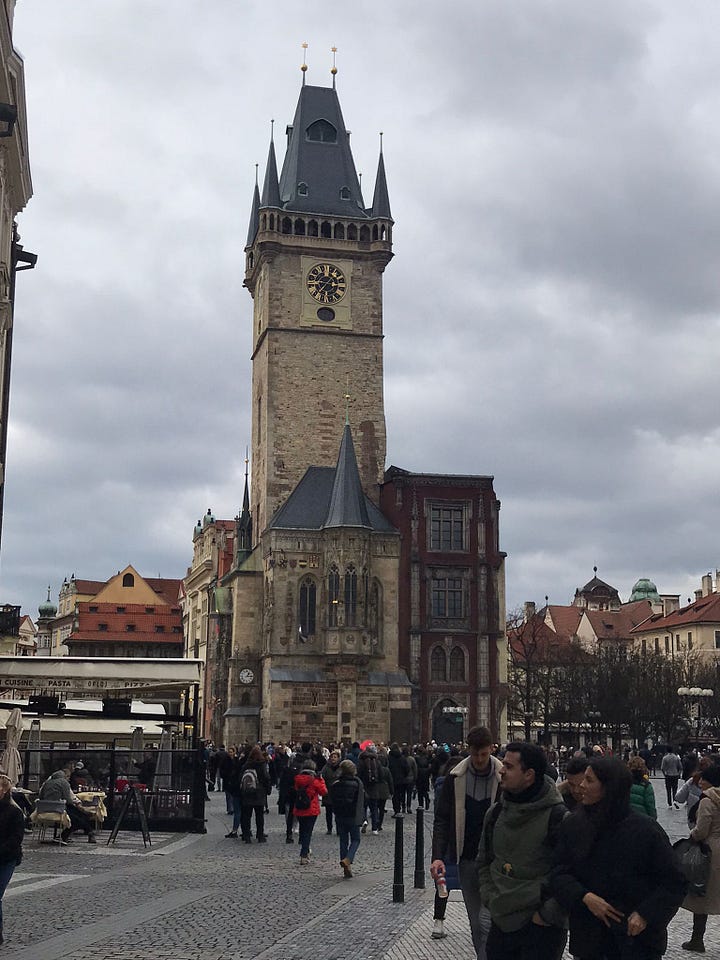
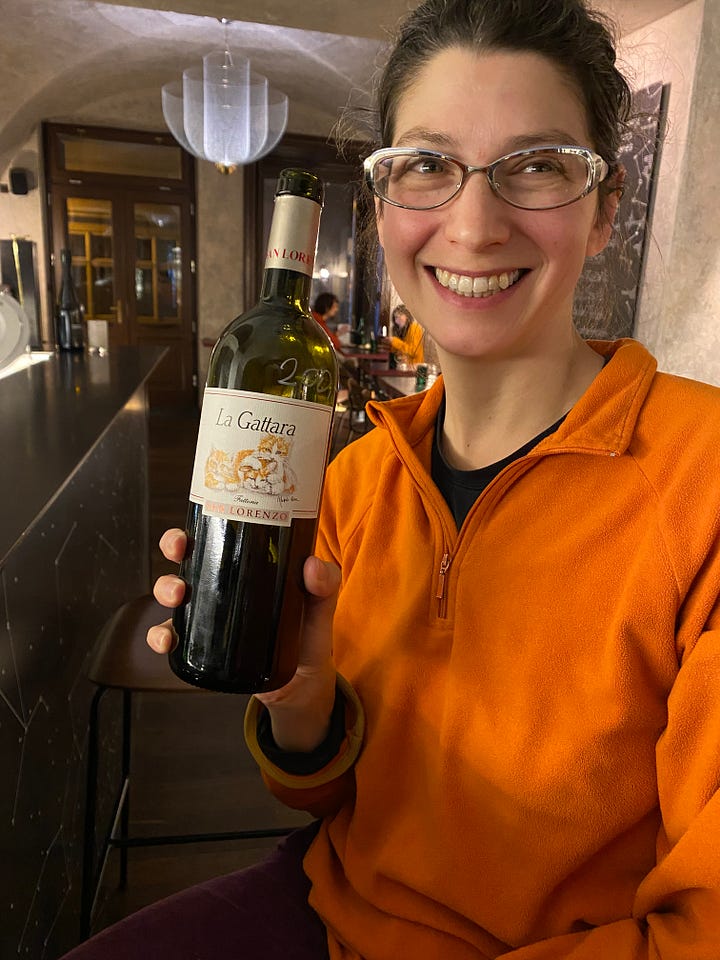


Enjoyed the read! Lots of information! And History!